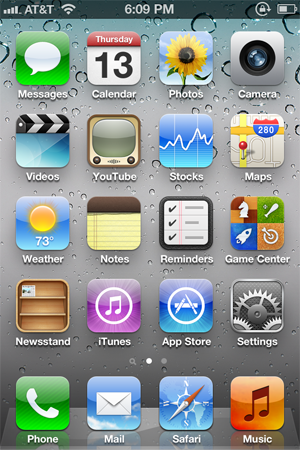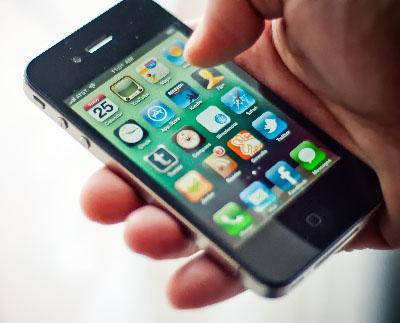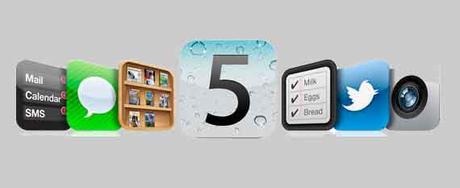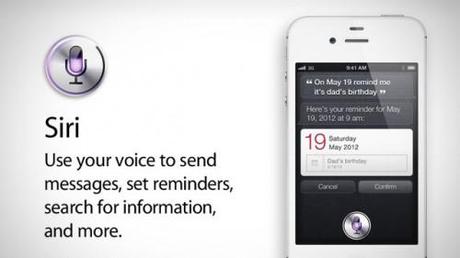
People love iOS, the phone is just the vessel to deliver it
Contents
- Specialization
- Less Involved
- Features
- Siri
- Wrap Up
In writing these comparison article, I've run into a conundrum as to how I should approach this. It's tempting to list every feature of the operating system for each different platform. But I think it'd be more pertinent to know what a certain OS does better than the others. It's also hard to do, but I have to separate the OS from the device. So blackberry's OS has to be unrelated to the phones themselves. iOS has to be judged on it's merits as an OS, but not what it can do with an iPhone attached.
I know it seems odd, but let's try a little blind comparison. Phone A has a 1.2 GHz dual core processor, 1 GB, a super high resolution screen and an 8 MP camera. Phone B has an 1 GHz dual core processor, 512 MB of RAM, a super high resolution screen and an 8 MP camera. Which do you choose? If you said phone A, you chose a Samsung Galaxy S II running Android. Phone B is the new iPhone 4S. From the blind comparison, the obvious choice is the Samsung. So what accounts for over one million people preordering the iPhone in the first day? It's got to be the OS. So while it may seem weird, you have to separate the OS from the phone to get a true comparison of it's merits. Having said that, let's get into why millions of people choose the lesser speced phone.

This is the only device running iOS; the iPhone
Specialization
We talked about one of the double edged swords of Android ownership, variety, in our pro-Android article. Apple chose to go in the opposite direction. Instead of having tons of choices for devices, you currently have three choices. Yeah, that's right, three choices. It sounds like I'm saying that's a bad thing; but it's really not. This lack of variety translates to a better guaranteed experience on any of the devices. Whereas other OSes have to match minimum hardware from dozens of device, iOS only has to worry about three. This allows developers to really hone in on what hardware their coding for and take full advantage of it's capabilities. Plus, since this is how Apple has done it from the beginning, they can begin to segue away from the oldest device available, iPhone 3GS, and only worry about the newer ones much earlier than other platforms. The oldest device has about a three year collection of apps and games for it, so developers don't really need worry about coding for it once a new phone is released.
This is the reason why our hypothetical situation from the intro is misleading. Android 2.3, the current version, isn't written to maximize the experience on the Galaxy S II. So while you'll have a faster experience than other Android devices with it, the Galaxy S II will not realize it's true potential until it is a bottom of the barrel phone. The iPhone, however, has an OS written to maximize it's hardware. So, while variety may be the spice of life, specialization is the best ingredient for a successful phone. And Apple has it down to a T.
Another benefit of Apple's specialization is the effect it has on updates. Unlike other OSes, where the updates have to be vetted by the manufacturers and adapted to their devices, iOS launches for all of it's devices. When iOS 5 released, the most recent Apple mobile OS, it was ready to go for iPhones, iPads and iPods. If your Apple product was getting an upgrade, you knew the day it launched. There is no waiting 6 months or more to get your updates.
Less Involved
In researching this article, I've read a lot about why people choose iPhone. And quite frankly, very few people do a good job articulating why you should choose it. They provide subjective reasoning like; "it just works" or "they have better apps" or "they're cooler". While these may be true to the author, they don't really help you the reader. To me, nothing is cooler than a monster processor with tons of RAM and well tuned architecture. So I can't, and won't ever, use those as reasons. But one thing that is beyond debate is that using an iPhone is less involved than other phones. Whether it be the simple layout, the guided user experience or the lack of maintenance required, Apple created a device that anyone can use with ease.
Since Android is iOS' main competition, I'll compare the user experience on the two. With Android, you need an app killer, an anti-virus/backup utility, a battery meter and more. You need the app killer because Android is perfectly fine letting processes run in the background indefinitely. It doesn't bother Android at all. But it does eat up resources, battery, memory and processor, and slow down your phone. Without an app killer, you'll quickly run out of processing resources and probably jump ship to iOS, which doesn't suffer from these problems. Due to Android's open development environment, apps can contain viruses. Google is the main cog in the Android machine, but it doesn't own Android. As such, no one has to vet an app before it hits the market. I've not experienced a virus from an app on my phone, but I wouldn't put it beyond unscrupulous developers to lace an app with malware. In Apple's case, the App Store runs through them. If you want to push an app to the store, you have to get it by Apple first. This typically means viruses are weeded out before the do any harm. I've actually never heard of a virus making it to the App Store. Battery life is an area where iOS is really better managed than others. Since I'm pretty critical of my battery life, I tend to do all the things necessary to ensure long life. But an average Android user may not ever be able to get through a full work day on a single charge. As I mentioned, iOS does a much better job managing battery life and people can sometimes go days without charging.

iOS packs some pretty nice features
Features
With the release of iOS 5, Apple added many features to the OS. When I've asked people about their favorites, many point to iMessage and the new notification center. Some have even implored me to share them with you. The problem with that is that these aren't unique to iOS; Notification center has been on Android's since day one and Blackberry Messenger beat iMessage to the table. So while these are excellent features, they aren't Apple exclusives or Apple perfected; though iMessage is arguably more useful than BBM. Apple does provide some excellent features within their OS that are entirely there own however; like awesome picture utilities, iTunes and Game Center.
Before we launch into this, I feel I should mention iCloud. Cloud storage is not an Apple exclusive; but iCloud is the best implementation for your Apple devices. iCloud allows you to wirelessly and seamlessly sync you iPhone, iPod, iPad and Mac. If you take a picture on your iPhone, it gets pushed to the cloud. Then, it becomes available on your other Apple devices without you having to do anything. It's like magic; but if you read the cloud storage article you'll know it isn't. This is a very cool feature, but it's not revolutionary for Apple, so it gets mentioned here instead of it's own section.
Apple has long been the choice for creative professionals; graphics artists and such. While I contest the perceived necessity, there's no denying that Apple does try to provide value to these people. This has spilled over into iOS, with the introduction of photo enhancements. Apple took the normal mobile phone, point and shoot, experience one step further with a few enhancement options. With iOS 5, you can do things like crop, enhance, rotate and even remove red-eye from your photos, all on your phone. You don't have to take the picture and upload it to your computer to do these enhancements anymore; Apple includes them in the OS. You can also organize your pictures with albums on your phone; which is much better than having hundreds of random photos on your phone.
iTunes is a software package I don't have to introduce anyone to. It's been the de facto choice for music and media organization software on Macs and PCs for about ten years now. It is one of the easiest, if not the easiest, media library software out there. But the only way to use it to organize media for your phone is with the iPhone. And iOS brings that convenience to it's mobile devices too. iOS has, by far, the best music playing experience. On Android, many people are forced to download a third party media player to enjoy a modicum of the convenience iOS users have. Windows Phone has Zune, which is the next best thing, but I think people give a slight edge to iTunes.
iOS devices also have access to Game Center; a social multiplayer game network. On other platforms, your gaming experience is a pretty solitary one. But with Game Center, Apple allows you to be a bit less introverted. You can invite friends or find random people to play your games with. If you're a gamer of any level, you know that gaming with others is much more fun than doing it alone. Game Center keeps leader boards and stats on it's players, so you can see exactly how you stack up with other players.
Siri

Siri is a game changer
If you've been a fan for a while, you saw my write up on Vlingo, a pretty awesome personal assistant app. You might recall that the best implementation of this was on the Android platform. Apple saw the challenge thrown down by Vlingo and the Android built in voice commands; and they answered in a big way. Siri is an iOS 5 on iPhone 4S exclusive, but it has potential to be the best piece of mobile software in existence. That's right, Siri can be that good. Right now, Siri is in her infancy, and she shows it on occasion. It is still a great app to have currently, but in the next year I think it will be enough to single handedly sell iPhones. It has a pretty good library of commands and actions right now; but just wait until Apple begins allowing outside developers to add to it. Just picture the day when you can tell your phone to "Buy tickets to (insert movie) for Friday at 8:00 PM at (insert theater)" and it have your tickets ready at your local theater, when you arrive. Or maybe you're taking your spouse on an impromptu second honeymoon. You can just turn to Siri and say "Book two first class seats to (insert travel destination) for tomorrow morning. And book three nights in (insert hotel of your choice) Also, rent a (insert car type) for 3 days." When Apple opens up the API's, code needed to communicate with it's software, to developers, these are less fantasy and more reality. Siri can be a game changer, and I think it will be.
Wrap Up
There are a number of good reasons to go with iOS; I merely outlined my favorite parts of it. If you're one of the people that bought it "because it works"; that's fine too. But I'd recommend remembering some of these reasons, they go further in arguments. iOS is an excellent platform that has a reputation for being user friendly and stable. Apple changed the landscape of mobile devices when it released it's iPod, and then again with the iPhone. As we saw in the scenario at the top, iPhone isn't a success because it has the best hardware; iOS has the distinction of being the biggest reason for iPhone's success. Thanks for reading, and if I missed something you like about iOS, let me know, I'd love to add your opinions here.
I know it seems odd, but let's try a little blind comparison. Phone A has a 1.2 GHz dual core processor, 1 GB, a super high resolution screen and an 8 MP camera. Phone B has an 1 GHz dual core processor, 512 MB of RAM, a super high resolution screen and an 8 MP camera. Which do you choose? If you said phone A, you chose a Samsung Galaxy S II running Android. Phone B is the new iPhone 4S. From the blind comparison, the obvious choice is the Samsung. So what accounts for over one million people preordering the iPhone in the first day? It's got to be the OS. So while it may seem weird, you have to separate the OS from the phone to get a true comparison of it's merits. Having said that, let's get into why millions of people choose the lesser speced phone.

This is the only device running iOS; the iPhone
Specialization
We talked about one of the double edged swords of Android ownership, variety, in our pro-Android article. Apple chose to go in the opposite direction. Instead of having tons of choices for devices, you currently have three choices. Yeah, that's right, three choices. It sounds like I'm saying that's a bad thing; but it's really not. This lack of variety translates to a better guaranteed experience on any of the devices. Whereas other OSes have to match minimum hardware from dozens of device, iOS only has to worry about three. This allows developers to really hone in on what hardware their coding for and take full advantage of it's capabilities. Plus, since this is how Apple has done it from the beginning, they can begin to segue away from the oldest device available, iPhone 3GS, and only worry about the newer ones much earlier than other platforms. The oldest device has about a three year collection of apps and games for it, so developers don't really need worry about coding for it once a new phone is released.
This is the reason why our hypothetical situation from the intro is misleading. Android 2.3, the current version, isn't written to maximize the experience on the Galaxy S II. So while you'll have a faster experience than other Android devices with it, the Galaxy S II will not realize it's true potential until it is a bottom of the barrel phone. The iPhone, however, has an OS written to maximize it's hardware. So, while variety may be the spice of life, specialization is the best ingredient for a successful phone. And Apple has it down to a T.
Another benefit of Apple's specialization is the effect it has on updates. Unlike other OSes, where the updates have to be vetted by the manufacturers and adapted to their devices, iOS launches for all of it's devices. When iOS 5 released, the most recent Apple mobile OS, it was ready to go for iPhones, iPads and iPods. If your Apple product was getting an upgrade, you knew the day it launched. There is no waiting 6 months or more to get your updates.
Less Involved
In researching this article, I've read a lot about why people choose iPhone. And quite frankly, very few people do a good job articulating why you should choose it. They provide subjective reasoning like; "it just works" or "they have better apps" or "they're cooler". While these may be true to the author, they don't really help you the reader. To me, nothing is cooler than a monster processor with tons of RAM and well tuned architecture. So I can't, and won't ever, use those as reasons. But one thing that is beyond debate is that using an iPhone is less involved than other phones. Whether it be the simple layout, the guided user experience or the lack of maintenance required, Apple created a device that anyone can use with ease.
Since Android is iOS' main competition, I'll compare the user experience on the two. With Android, you need an app killer, an anti-virus/backup utility, a battery meter and more. You need the app killer because Android is perfectly fine letting processes run in the background indefinitely. It doesn't bother Android at all. But it does eat up resources, battery, memory and processor, and slow down your phone. Without an app killer, you'll quickly run out of processing resources and probably jump ship to iOS, which doesn't suffer from these problems. Due to Android's open development environment, apps can contain viruses. Google is the main cog in the Android machine, but it doesn't own Android. As such, no one has to vet an app before it hits the market. I've not experienced a virus from an app on my phone, but I wouldn't put it beyond unscrupulous developers to lace an app with malware. In Apple's case, the App Store runs through them. If you want to push an app to the store, you have to get it by Apple first. This typically means viruses are weeded out before the do any harm. I've actually never heard of a virus making it to the App Store. Battery life is an area where iOS is really better managed than others. Since I'm pretty critical of my battery life, I tend to do all the things necessary to ensure long life. But an average Android user may not ever be able to get through a full work day on a single charge. As I mentioned, iOS does a much better job managing battery life and people can sometimes go days without charging.

iOS packs some pretty nice features
Features
With the release of iOS 5, Apple added many features to the OS. When I've asked people about their favorites, many point to iMessage and the new notification center. Some have even implored me to share them with you. The problem with that is that these aren't unique to iOS; Notification center has been on Android's since day one and Blackberry Messenger beat iMessage to the table. So while these are excellent features, they aren't Apple exclusives or Apple perfected; though iMessage is arguably more useful than BBM. Apple does provide some excellent features within their OS that are entirely there own however; like awesome picture utilities, iTunes and Game Center.
Before we launch into this, I feel I should mention iCloud. Cloud storage is not an Apple exclusive; but iCloud is the best implementation for your Apple devices. iCloud allows you to wirelessly and seamlessly sync you iPhone, iPod, iPad and Mac. If you take a picture on your iPhone, it gets pushed to the cloud. Then, it becomes available on your other Apple devices without you having to do anything. It's like magic; but if you read the cloud storage article you'll know it isn't. This is a very cool feature, but it's not revolutionary for Apple, so it gets mentioned here instead of it's own section.
Apple has long been the choice for creative professionals; graphics artists and such. While I contest the perceived necessity, there's no denying that Apple does try to provide value to these people. This has spilled over into iOS, with the introduction of photo enhancements. Apple took the normal mobile phone, point and shoot, experience one step further with a few enhancement options. With iOS 5, you can do things like crop, enhance, rotate and even remove red-eye from your photos, all on your phone. You don't have to take the picture and upload it to your computer to do these enhancements anymore; Apple includes them in the OS. You can also organize your pictures with albums on your phone; which is much better than having hundreds of random photos on your phone.
iTunes is a software package I don't have to introduce anyone to. It's been the de facto choice for music and media organization software on Macs and PCs for about ten years now. It is one of the easiest, if not the easiest, media library software out there. But the only way to use it to organize media for your phone is with the iPhone. And iOS brings that convenience to it's mobile devices too. iOS has, by far, the best music playing experience. On Android, many people are forced to download a third party media player to enjoy a modicum of the convenience iOS users have. Windows Phone has Zune, which is the next best thing, but I think people give a slight edge to iTunes.
iOS devices also have access to Game Center; a social multiplayer game network. On other platforms, your gaming experience is a pretty solitary one. But with Game Center, Apple allows you to be a bit less introverted. You can invite friends or find random people to play your games with. If you're a gamer of any level, you know that gaming with others is much more fun than doing it alone. Game Center keeps leader boards and stats on it's players, so you can see exactly how you stack up with other players.
Siri

Siri is a game changer
If you've been a fan for a while, you saw my write up on Vlingo, a pretty awesome personal assistant app. You might recall that the best implementation of this was on the Android platform. Apple saw the challenge thrown down by Vlingo and the Android built in voice commands; and they answered in a big way. Siri is an iOS 5 on iPhone 4S exclusive, but it has potential to be the best piece of mobile software in existence. That's right, Siri can be that good. Right now, Siri is in her infancy, and she shows it on occasion. It is still a great app to have currently, but in the next year I think it will be enough to single handedly sell iPhones. It has a pretty good library of commands and actions right now; but just wait until Apple begins allowing outside developers to add to it. Just picture the day when you can tell your phone to "Buy tickets to (insert movie) for Friday at 8:00 PM at (insert theater)" and it have your tickets ready at your local theater, when you arrive. Or maybe you're taking your spouse on an impromptu second honeymoon. You can just turn to Siri and say "Book two first class seats to (insert travel destination) for tomorrow morning. And book three nights in (insert hotel of your choice) Also, rent a (insert car type) for 3 days." When Apple opens up the API's, code needed to communicate with it's software, to developers, these are less fantasy and more reality. Siri can be a game changer, and I think it will be.
Wrap Up
There are a number of good reasons to go with iOS; I merely outlined my favorite parts of it. If you're one of the people that bought it "because it works"; that's fine too. But I'd recommend remembering some of these reasons, they go further in arguments. iOS is an excellent platform that has a reputation for being user friendly and stable. Apple changed the landscape of mobile devices when it released it's iPod, and then again with the iPhone. As we saw in the scenario at the top, iPhone isn't a success because it has the best hardware; iOS has the distinction of being the biggest reason for iPhone's success. Thanks for reading, and if I missed something you like about iOS, let me know, I'd love to add your opinions here.


